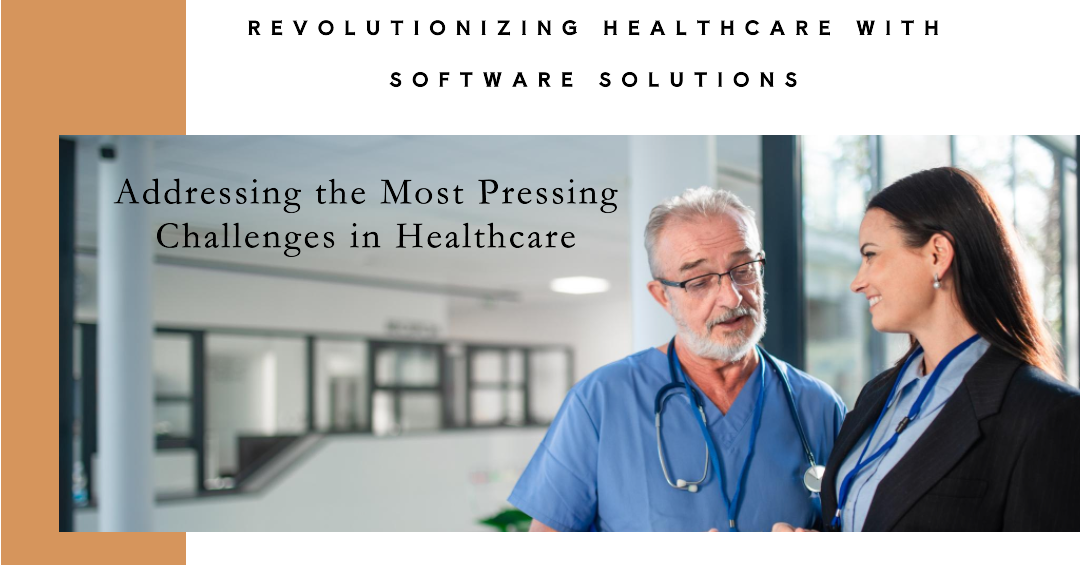Table of Contents
ToggleImage Credit : Microsoft designer
Key Takeaways
- Digital Healthcare: Software solutions, from EHRs to AI, are modernizing and optimizing patient care.
- Empowering Patients: Telemedicine and engagement tools enhance accessibility and patient involvement.
- Safety & Streamlining: Cybersecurity safeguards data while interoperability and AI ensure efficient care.
Want To Learn More?
In the ever-evolving realm of healthcare, the need for efficient, innovative, and reliable software solutions has never been more pronounced. As healthcare professionals strive to provide the best care amidst an environment fraught with challenges, the tech industry is stepping up to lend a helping hand. In this blog, we will explore how software solutions are addressing some of the most pressing issues in healthcare.
1. Electronic Health Records (EHR)
Challenge: Keeping track of patient history, treatments, medications, and other vital information can be daunting, especially with paper-based systems which can be prone to errors and misplacements.
Solution: EHR systems have transformed how patient data is stored, accessed, and shared. These digital systems ensure accurate, updated, and easily retrievable patient data. With features such as real-time updates, EHRs eliminate the inefficiencies and mistakes associated with manual record-keeping.
2. Telemedicine Platforms
Challenge: Access to quality healthcare can be limited by geographical barriers, lack of transportation, or the current global pandemic restrictions.
Solution: Telemedicine platforms have emerged as a boon, allowing patients to consult with healthcare professionals remotely. These platforms incorporate video conferencing, secure messaging, and even remote monitoring tools, ensuring patients receive quality care from the comfort of their homes.
3. Predictive Analytics
Challenge: Healthcare professionals often need to make split-second decisions. Having the ability to forecast patient needs or potential health crises can be lifesaving.
Solution: Predictive analytics software processes vast amounts of patient data to foresee potential health risks, helping clinicians intervene proactively. This not only improves patient outcomes but also optimizes resource allocation.
4. Interoperability Solutions
Challenge: In the interconnected world of healthcare, the inability of different systems to communicate can hinder patient care.
Solution: Interoperability software solutions ensure that different healthcare systems can seamlessly share and access patient data. This streamlines the care process, reduces duplicative tests, and ensures that every healthcare provider has the information they need.
5. Patient Engagement Tools
Challenge: Ensuring patients remain informed, involved, and accountable for their health can be challenging.
Solution: Patient portals, mobile health apps, and wearable devices are now empowering patients to take an active role in their health. These tools offer access to personal health data, medication reminders, and personalized health tips, fostering a deeper engagement with one’s health journey.
6. Cybersecurity Solutions
Challenge: With the increasing digitalization in healthcare, there’s a heightened risk of cyber threats, data breaches, and unauthorized access to sensitive patient data.
Solution: Advanced cybersecurity software solutions are being implemented across healthcare facilities to ensure that patient data remains confidential and protected from potential threats. Encryption, multi-factor authentication, and continuous monitoring are just a few strategies in place.
7. AI-Powered Diagnostic Tools
Challenge: Rapid and accurate diagnosis can be challenging, especially with rare conditions or subtle symptoms.
Solution: AI-powered diagnostic software can analyze clinical data, imagery, and patient history to assist clinicians in pinpointing potential diagnoses. This speeds up the diagnostic process and can help identify issues that might be overlooked by the human eye.
Conclusion
As the healthcare sector grapples with its unique challenges, software solutions are stepping in to bridge the gaps, optimize processes, and enhance patient care. With the continued integration of technology, the future of healthcare promises to be more efficient, accessible, and patient-centric than ever before.
MarkiTech.AI is a team of over 50 software engineers, data scientists and clinicians plus other health practitioners who have developed over 40 digital health solutions in the last 10 years such as SenSights.AI, Veyetals.com and CliniScripts.com which focus on helping older adults and their caregivers like family, physicians, nurses etc., age in place, reduce costs and improve revenue opportunities.








Recent Comments